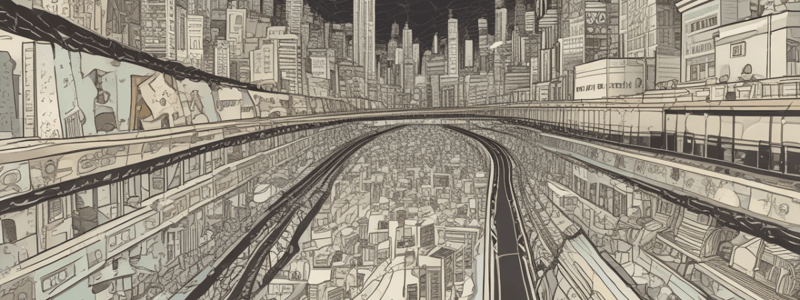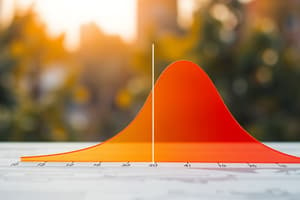Podcast
Questions and Answers
What is the main cause of cyclical unemployment?
What is the main cause of cyclical unemployment?
- Discrimination and job reservation
- Changes in consumer preferences
- Economic recession (correct)
- Imperfect information and job shopping
Structural unemployment is normally short-term.
Structural unemployment is normally short-term.
False (B)
What is the natural unemployment rate?
What is the natural unemployment rate?
The rate of unemployment that is expected when an economy is operating at full capacity.
Seasonal unemployment is caused by seasonal shifts in labour _______________ and demand.
Seasonal unemployment is caused by seasonal shifts in labour _______________ and demand.
Match the following types of unemployment with their definitions:
Match the following types of unemployment with their definitions:
What is NOT a cause of structural unemployment?
What is NOT a cause of structural unemployment?
The Phillips Curve shows a trade-off between unemployment and inflation.
The Phillips Curve shows a trade-off between unemployment and inflation.
What is frictional unemployment?
What is frictional unemployment?
What is the most frequently used measure of unemployment?
What is the most frequently used measure of unemployment?
Frictional unemployment is normally long-term.
Frictional unemployment is normally long-term.
What is the name of the unemployment that occurs when there is a temporary decrease in aggregate demand?
What is the name of the unemployment that occurs when there is a temporary decrease in aggregate demand?
Unemployment is a phenomenon that occurs when a person who is actively searching for employment is unable to find __________________.
Unemployment is a phenomenon that occurs when a person who is actively searching for employment is unable to find __________________.
Match the following types of unemployment with their descriptions:
Match the following types of unemployment with their descriptions:
What is the name of the curve that shows the relationship between unemployment and inflation?
What is the name of the curve that shows the relationship between unemployment and inflation?
What is the name of the natural rate of unemployment in an economy?
What is the name of the natural rate of unemployment in an economy?
Structural unemployment is a type of unemployment that occurs when there is a seasonal decrease in demand for certain industries.
Structural unemployment is a type of unemployment that occurs when there is a seasonal decrease in demand for certain industries.
Who pioneered the concept of the Phillips curve?
Who pioneered the concept of the Phillips curve?
The Phillips curve is a direct relationship between unemployment rate and inflation.
The Phillips curve is a direct relationship between unemployment rate and inflation.
What is the consequence of an increase in aggregate demand on unemployment?
What is the consequence of an increase in aggregate demand on unemployment?
The Phillips curve fails to justify the situation of _______________, when both inflation and unemployment are alarmingly high.
The Phillips curve fails to justify the situation of _______________, when both inflation and unemployment are alarmingly high.
What happens to inflation as the economy gets closer to full capacity?
What happens to inflation as the economy gets closer to full capacity?
The Phillips curve is a long-term relationship between unemployment rate and inflation.
The Phillips curve is a long-term relationship between unemployment rate and inflation.
Match the following types of unemployment with their definitions:
Match the following types of unemployment with their definitions:
What is the main implication of the Phillips curve for economic policies?
What is the main implication of the Phillips curve for economic policies?
Flashcards are hidden until you start studying
Study Notes
Phillips Curve
- The Phillips Curve is the inverse relationship between unemployment rate and inflation when graphically charted.
- It was first introduced by William Phillips in 1958 in his paper "The Relation between Unemployment and the Rate of Change of Money Wage Rates in the United Kingdom, 1861-1957".
- The theory states that higher inflation rates correlate with lower unemployment rates, and vice versa.
- High levels of employment can be achieved only at high levels of inflation.
- The implications of the Phillips Curve are only true in the short term and fail to justify the situations of stagflation, when both inflation and unemployment are high.
Mechanism behind the Phillips Curve
- An increase in aggregate demand (AD) causes higher real GDP and lower unemployment.
- As the economy gets closer to full capacity, inflationary pressures increase, causing higher inflation.
- Workers can demand higher money wages, and firms can put up prices due to rising demand, resulting in higher inflation and lower unemployment.
Unemployment
- Unemployment is a phenomenon that occurs when a person who is actively searching for employment is unable to find work.
- The unemployment rate is the percentage of the labor force that is unemployed and is a key indicator of the economy's health.
- The most frequently measured indicator of unemployment is the unemployment rate, which is the number of unemployed people divided by the number of people in the labor force.
Types of Unemployment
- There are four types of unemployment: frictional, cyclical, structural, and seasonal.
Frictional Unemployment
- Frictional unemployment is also called search unemployment and arises from the normal operation of the labor market.
- It includes people who are moving from one job to another, people who enter the labor force and are looking for a first job, and people who get fired.
- Frictional unemployment is normally short-term.
Cyclical Unemployment
- Cyclical unemployment is also referred to as demand-deficient unemployment and occurs when there is a temporary decrease in aggregate demand.
- It occurs during periods of recession or slump in the economy, causing a reduction in production and an increase in unemployment.
- Cyclical unemployment may be short- or long-term.
Structural Unemployment
- Structural unemployment is caused by structural changes in the economy or the way in which the economy is organized.
- It occurs when workers lack the necessary skills, education, or training required to get a job, or due to changes in production methods or techniques that replace workers with machines.
- Structural unemployment is normally long-term.
Seasonal Unemployment
- Seasonal unemployment is caused by seasonal shifts in labor supply and demand.
- It occurs in industries that require workers only for part of the year, such as tourism, agriculture, or fishing.
- Seasonal unemployment is a normal part of the labor market and is not considered a problem.
Studying That Suits You
Use AI to generate personalized quizzes and flashcards to suit your learning preferences.



